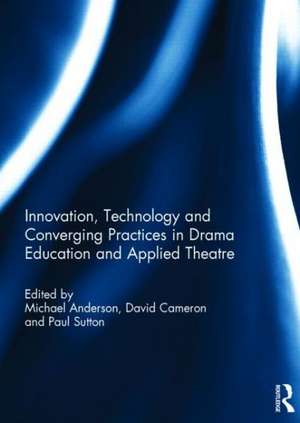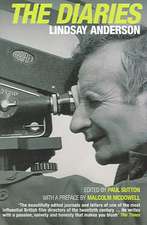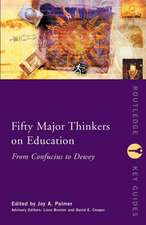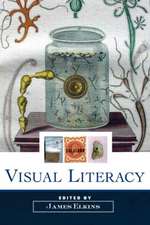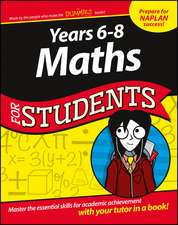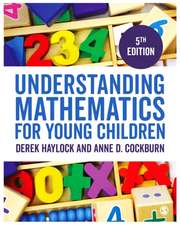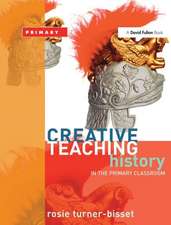Innovation, Technology and Converging Practices in Drama Education and Applied Theatre
Editat de Michael Anderson, David Cameron, Paul Suttonen Limba Engleză Hardback – 26 sep 2014
This book was originally published as a special issue of RiDE: The Journal of Applied Theatre and Performance.
Toate formatele și edițiile
| Toate formatele și edițiile | Preț | Express |
|---|---|---|
| Paperback (1) | 253.67 lei 6-8 săpt. | |
| Taylor & Francis – 18 dec 2020 | 253.67 lei 6-8 săpt. | |
| Hardback (1) | 819.90 lei 6-8 săpt. | |
| Taylor & Francis – 26 sep 2014 | 819.90 lei 6-8 săpt. |
Preț: 819.90 lei
Preț vechi: 1102.76 lei
-26% Nou
Puncte Express: 1230
Preț estimativ în valută:
156.89€ • 163.48$ • 129.90£
156.89€ • 163.48$ • 129.90£
Carte tipărită la comandă
Livrare economică 04-18 aprilie
Preluare comenzi: 021 569.72.76
Specificații
ISBN-13: 9781138803190
ISBN-10: 1138803197
Pagini: 166
Dimensiuni: 174 x 246 x 15 mm
Greutate: 0.45 kg
Ediția:1
Editura: Taylor & Francis
Colecția Routledge
Locul publicării:Oxford, United Kingdom
ISBN-10: 1138803197
Pagini: 166
Dimensiuni: 174 x 246 x 15 mm
Greutate: 0.45 kg
Ediția:1
Editura: Taylor & Francis
Colecția Routledge
Locul publicării:Oxford, United Kingdom
Public țintă
Postgraduate and UndergraduateCuprins
1. Introduction: Participation and creation in these brave new worlds: technology and innovation as part of the landscape Michael Anderson, David Cameron and Paul Sutton 2. Combining drama pedagogy with digital technologies to support the language learning needs of newly arrived refugee children: a classroom case study Julie Dunn, Penny Bundy and Nina Woodrow 3. Liveness, mediation and immediacy – innovative technology use in process and performance Susan Davis 4. Process drama and digital games as text and action in virtual worlds: developing new literacies in school Joanne O’Mara 5. Telling tales in and out of school: youth performativities with digital storytelling Prue Wales 6. Digital culture, and the viewing/participating pre-service teacher: (re)envisioning theatre teacher training for a social media culture Amy Jensen 7. Newspaper Twitter: applied drama and microblogging Rebecca Wotzko 8. Solo life to Second Life: the design of physical and virtual learning spaces inspired by the drama classroom Jennifer Nicholls and Robyn Philip 9. Shaping Networked Theatre: experience architectures, behaviours and creative pedagogies Paul Sutton
Descriere
This edition collection showcases the increasing intersections between drama and applied theatre, education, innovation and technology.
This book was originally published as a special issue of RiDE: The Journal of Applied Theatre and Performance.
This book was originally published as a special issue of RiDE: The Journal of Applied Theatre and Performance.
Notă biografică
Michael Anderson is an associate professor in the Faculty of Education and Social Work at The University of Sydney, Australia. His research and teaching concentrates on how arts educators begin, evolve and achieve growth in their careers and how students engage with arts and technology to learn and create in arts education. This work has evolved into a program of research and publication that engages with arts classrooms directly. His recent publications explore how aesthetic education is changing in the 21st Century. These publications includePartnerships in Education Research: Creating Knowledge that Matters (with Kelly Freebody, 2014),Masterclass in Drama Education(UK),Teaching the Screen, Film Education for Generation Next(with Miranda Jefferson), Drama with Digital Technology (with John Carroll and David Cameron, 2009) andReal Players: Drama, Education and Technology (with John Carroll and David Cameron Trentham, 2006).
David Cameron is Deputy Director of Academic Technologies, the University of Newcastle, Australia. David's research interests are in the areas of drama, digital games, social media and mobile technology. His PhD explored the similarities between some forms of educational drama and digital game-based learning. David has a professional and teaching background in media and communication, including radio journalism and community broadcasting.
Paul Sutton is the Artistic Director of C&T. Mixing applied theatre and digital media, C&T create collaborative online drama projects for schools, colleges and universities. Examples of these projects include the Livingnewspaper.net – a reinvention of the classic documentary form of the Living Newspaper for the internet age, allowing young people to make drama about issues that matter to them, Stratar.net a performance-based digital mapping tool, and Lip Sync where young people use popular music to create ethnographic music videos. Together these schools and projects form the C&T Network: a sequence of partnerships linking schools in the UK, New York, Washington DC, Nairobi, Beijeng and Tokyo enabling young people to collaborate in creating drama that connects with their lives, cultures and aspirations.
Working predominantly through practiced-based research, Paul’s interests reflect those of C&T, exploring the synergies that can be built between drama, performance and digital technologies and the potential for learning and development that can be achieved through this work in an age of increasing globalisation. This work embraces process drama, social media, augmented reality, theatre for development, docu-drama and psycho-geography.
Paul is Multi-Media Editor of RiDE: the Journal of Applied Theatre and Performance and an Artistic Assessor for Arts Council England, for whom he acts as an advisor on digital media.
David Cameron is Deputy Director of Academic Technologies, the University of Newcastle, Australia. David's research interests are in the areas of drama, digital games, social media and mobile technology. His PhD explored the similarities between some forms of educational drama and digital game-based learning. David has a professional and teaching background in media and communication, including radio journalism and community broadcasting.
Paul Sutton is the Artistic Director of C&T. Mixing applied theatre and digital media, C&T create collaborative online drama projects for schools, colleges and universities. Examples of these projects include the Livingnewspaper.net – a reinvention of the classic documentary form of the Living Newspaper for the internet age, allowing young people to make drama about issues that matter to them, Stratar.net a performance-based digital mapping tool, and Lip Sync where young people use popular music to create ethnographic music videos. Together these schools and projects form the C&T Network: a sequence of partnerships linking schools in the UK, New York, Washington DC, Nairobi, Beijeng and Tokyo enabling young people to collaborate in creating drama that connects with their lives, cultures and aspirations.
Working predominantly through practiced-based research, Paul’s interests reflect those of C&T, exploring the synergies that can be built between drama, performance and digital technologies and the potential for learning and development that can be achieved through this work in an age of increasing globalisation. This work embraces process drama, social media, augmented reality, theatre for development, docu-drama and psycho-geography.
Paul is Multi-Media Editor of RiDE: the Journal of Applied Theatre and Performance and an Artistic Assessor for Arts Council England, for whom he acts as an advisor on digital media.
